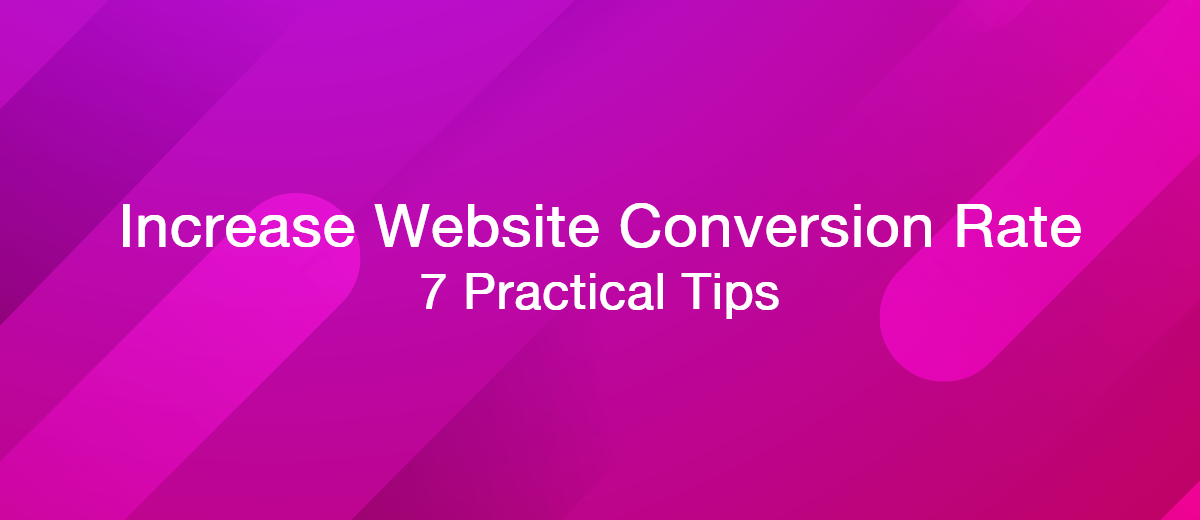7 Practical Tips to Increase Your Website Conversion Rate
The website's usability, consumer confidence in your brand, the relevance of the incoming traffic, and several other elements all play a role in conversion rate. Continuously improving your website for more conversions is a no-brainer if you want to ensure you get the most for your marketing dollar. However, you can frequently find yourself in a bind while trying a social media scheduler to devise a step-by-step plan that produces valuable outcomes. This blog article presents seven statistically supported strategies you may apply to boost your website's conversion rate and enhance your bottom line as a starting point.
What is the Website Conversion Rate?
The proportion of site visitors that carry out the intended action is known as the website conversion rate. The process, which differs between websites, transforms visitors into paying clients. For instance, making a purchase, registering for a membership, subscribing to emails, signing up for a trial, downloading an e-book or software, scheduling a demo, etc.
The website conversion rate is an important indicator of how well-optimized your website is and of the potential for increased revenue. If the conversion rate on your website is greater, it means three things in particular:
- You can draw in the appropriate clientele with your goods and services.
- Your audience will be receptive to the website copy, messaging, calls to action (CTAs), etc.
- Your attempts to make the user experience more straightforward and more intuitive are admirable.
Best 7 Effective Practical Tips to Increase Your Website Conversion Rate

Getting a good flow of visitors to your website is great, but if they are not converting by taking the desired action, it means something needs to be fixed. Therefore, it is critical to identify what are the loopholes in your website and work smartly to get over them.
Here is a summary of the seven best practical strategies for getting your visitors to take the right action and increase website conversions.
Build a Landing Page
Landing pages are a type of web page designed to convert visitors into customers. These pages are often used in marketing campaigns and can be used to collect email addresses, sell products, or promote an event. It's common for people to confuse a landing page with a sales funnel, but it should be clear before you begin.
A landing page is a specific page on your website that is designed to convert visitors into customers. Landing pages are often used in marketing campaigns because they allow you to target specific users and market directly to them using the right message at the right time.
Make Your Website Easy to Read
The first tip for increasing your website conversion rate is to make your website easy to read. When your visitors arrive at a new page, they want to immediately understand what it's about and where they can find more information if needed. These are the most important factors when it comes to making your site easy to read:
- Use a large font size — the bigger the text, the better! For example, if you're using an image as part of an article title, consider putting that image in its box instead so that all you have left is just text.
- Use a readable font style — if you choose something too fancy or difficult-to-read (like Comic Sans or Papyrus), people won't want anything to do with it because they'll have trouble reading through it all! Instead, try something modern and readable; this will help keep things looking clean while also making sure nothing gets lost in translation along the way!
Use White Space
White space is a good thing. It makes the page look cleaner, it makes the content easier to read and understand, it makes your website more visually appealing, and it helps make navigation easier for users.


We're not just talking about white space that comes from blank margins or padding around images; we're also talking about negative space: The area that's left vacant between different pieces of content on your webpage. This includes things like dedicated landing pages where you have one specific call-to-action (CTA) — think "read more" links below articles or blog posts — or text that promotes another area of your website ("subscribe here"). A good rule of thumb is to use negative space sparingly; only use it when necessary because too much of this can confuse users trying to explore your site's content further than other elements on the page have already led them.
Optimize your Website for Mobile Traffic
Mobile traffic is growing rapidly, mobile users will make up over 50% of your site's traffic. Mobile users tend to be impatient. This is because mobile devices are often used for specific tasks, such as ordering food, buying tickets for events, or finding the closest gas station — all things that can be done quickly. Additionally, many mobile users only have one hand available when performing these tasks; therefore, they expect to complete them efficiently and effortlessly. To overcome this challenge and ensure your website is optimized for mobile traffic:
- Use video and live chat features on your site (instead of text)! This helps eliminate the need for scrolling through long pages of text-based content and increases user engagement with your brand.
- Keep all buttons large enough, so they're easy to click on while holding the phone in one hand (and remember the buttons at the bottom of your screen!).
Add a 404 Page
404 pages are important because they let visitors know their request was not completed and give them instructions on how to fix it. Some of the most common reasons for a 404 error include the following:
- The page no longer exists or is temporarily unavailable.
- A mistyped URL.
- An outdated link (if you're linking to an external site that has moved).
You can create a simple 404 page from scratch using HTML code by hand or use one of many free online tools to help you create one quickly and efficiently.
Include a Call to Action on Every Page
It's essential to make it easy for visitors to find the information they need. However, it's equally important to make it easy for visitors to contact you or act. You can do this by including a call-to-action (CTA) button on every page of your website. A CTA is an actionable link that tells people exactly what you want them to do next, whether filling out a form or downloading something from your site.
For example, suppose someone visits one of your landing pages and requires additional information about one of your products or services. In that case, they can click on the "Learn More" CTA button to go directly where they need, without having to dig through multiple pages on your website.
Add a Chatbox
An extra-special way to increase your conversion rate is to add a chat box at the bottom of each page. This can be used for customer service and quick response time, and adds a personal touch that's hard to find in today's world of digital commerce. Check out the best places to sell online that will also provide an option of a chatbot for better business operations. In addition, it can be used as an augmentation tool by offering additional information or allowing users to ask questions about your products or services.
Bonus Track: It's All In What You Say
While some visitors to your website intend to make purchases, some require a little encouragement to believe the transaction is in their best interest. While you would rather not come out as pushy, you do need to subtly persuade certain individuals that they "need" your goods or service. But, again, be clear about what the customer may anticipate. You'd be surprised at how far straightforward honesty can go in business.
Conclusion
Your marketing ROI will rise if you can raise conversion rates. The greater the influence existing traffic has on your top line, the more visitors you convert. Start with the techniques mentioned above to increase your conversion rates strategically. However, some of these are more likely to produce favorable outcomes for your company than others. Setting goals, gathering information, and conducting ongoing objective testing to determine what appeals to your target market are crucial.
Strive to take your business to the next level, achieve your goals faster and more efficiently? Apix-Drive is your reliable assistant for these tasks. An online service and application connector will help you automate key business processes and get rid of the routine. You and your employees will free up time for important core tasks. Try Apix-Drive features for free to see the effectiveness of the online connector for yourself.

